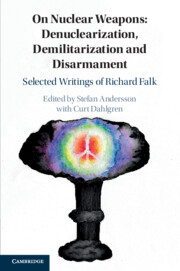 On Nuclear Weapons: Denuclearization, Demilitarization and Disarmament
On Nuclear Weapons: Denuclearization, Demilitarization and Disarmament Book contents
- On Nuclear Weapons: Essays by Richard Falk on Denuclearization, Demilitarization, and Disarmament
- On Nuclear Weapons: Essays by Richard Falk on Denuclearization, Demilitarization, and Disarmament
- Copyright page
- Dedication
- Epigraph
- Contents
- Foreword by Zia Mian
- Preface by Richard Falk
- Acknowledgments
- Part I International Law and World Order
- Part II Impacts of Democracy, Neutrality, and National Interest
- Contents
- 7 Nuclear Weapons and the End of Democracy
- 8 Nuclear Weapons and the Renewal of Democracy
- 9 Neutrality, International Law, and the Nuclear Arms Race
- 10 Nuclearism and National Interest
- 11 A Radical World Order Challenge
- Part III Nuclear Policy Initiatives
- Part IV Remembering the Past, Encountering the Future
- Index
10 - Nuclearism and National Interest
The Situation of a Nonnuclear Ally
from Part II - Impacts of Democracy, Neutrality, and National Interest
Published online by Cambridge University Press: 04 July 2019
- On Nuclear Weapons: Essays by Richard Falk on Denuclearization, Demilitarization, and Disarmament
- On Nuclear Weapons: Essays by Richard Falk on Denuclearization, Demilitarization, and Disarmament
- Copyright page
- Dedication
- Epigraph
- Contents
- Foreword by Zia Mian
- Preface by Richard Falk
- Acknowledgments
- Part I International Law and World Order
- Part II Impacts of Democracy, Neutrality, and National Interest
- Contents
- 7 Nuclear Weapons and the End of Democracy
- 8 Nuclear Weapons and the Renewal of Democracy
- 9 Neutrality, International Law, and the Nuclear Arms Race
- 10 Nuclearism and National Interest
- 11 A Radical World Order Challenge
- Part III Nuclear Policy Initiatives
- Part IV Remembering the Past, Encountering the Future
- Index
Summary
Thank you very much for that generous introduction. It is an exceptional privilege and honor for me to be here this evening to deliver this lecture on behalf of the New Zealand Foundation for Peace Studies. I admire very much this Foundation’s contribution to the work of peace studies, which has been well known to me for some years; I commend especially the Foundation for being so deeply committed to the work of peace before peace became as fashionable as it now is, fortunately. It is the quality of this commitment that has helped build awareness and provided the witness that humanity is not forever locked into the war system. It is this abiding commitment that has helped create a climate enabling such a powerful peace movement to take hold in this country. This achievement inspires us in other parts of the world.
I want to take this opportunity tonight to try to say some things that are tentative, that look toward extending the horizon of what seems possible. I do this at the risk, a hard one for academics to undertake, of seeming foolish. This fear of seeming foolish is a severe inhibition upon the creative facilities of our educators. It is one of the ways we deprive our students of any hope for the future. Unless a teacher is prepared to be foolish at least in the sense of defying the canons of conventional orthodoxy, patterns of thought and belief will remain trapped forever within the confines of what I call an obsolete realism.
- Type
- Chapter
- Information
- On Nuclear Weapons: Denuclearization, Demilitarization and DisarmamentSelected Writings of Richard Falk, pp. 183 - 197Publisher: Cambridge University PressPrint publication year: 2019
